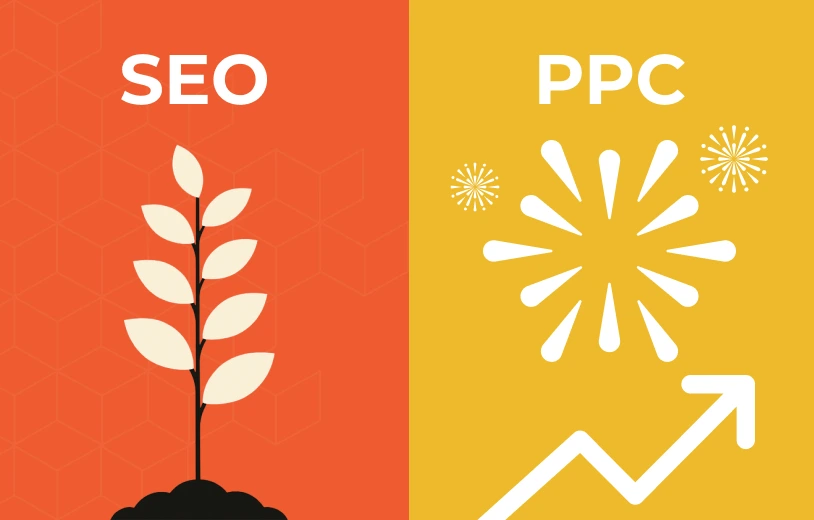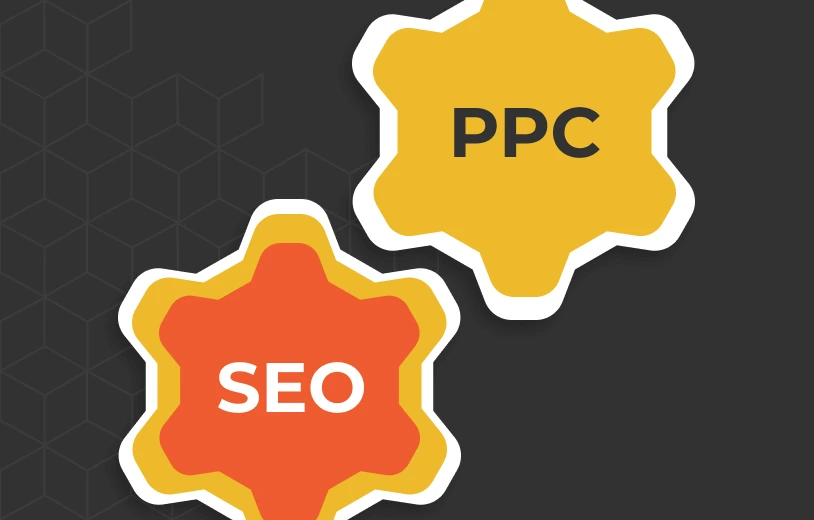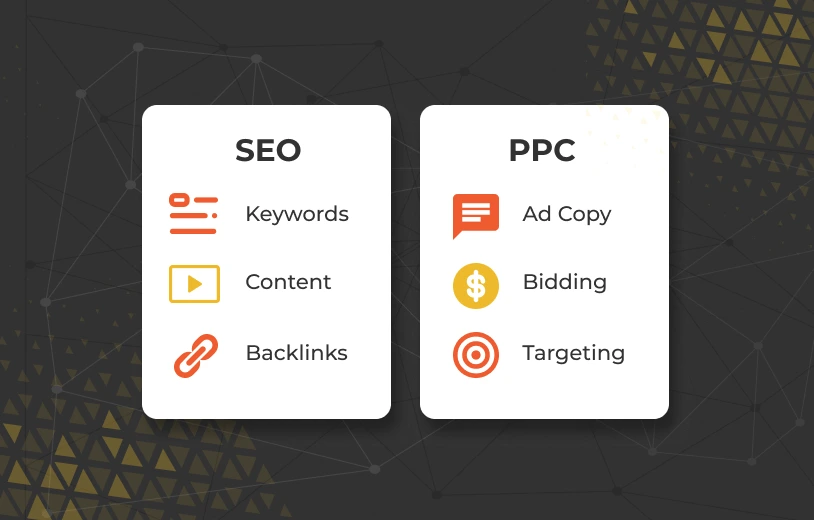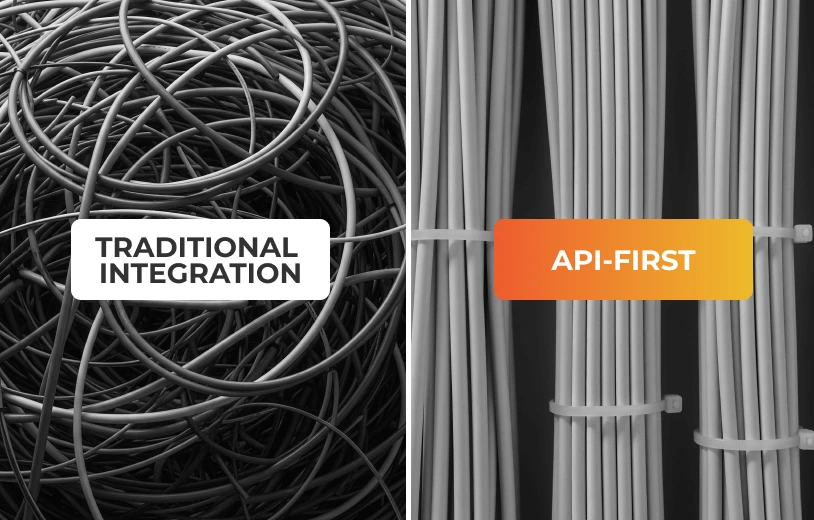Key Takeaways
- SEO (Search Engine Optimization) focuses on organic rankings, building long-term authority and visibility over time, and offering sustainable traffic without direct per-click costs.
- PPC (Pay-Per-Click) Advertising provides immediate visibility and traffic, allowing for precise targeting and quick results, but requires ongoing budget for clicks.
- SEO is a long-term investment building foundational online presence and brand authority.
- PPC is ideal for immediate impact, product launches, promotions, and precise audience targeting.
- The “right” choice often involves a combination of both, leveraging PPC for immediate needs while building a robust SEO foundation for sustainable growth.
- Factors like budget, timeline, industry competition, and business goals should influence whether your strategy prioritizes SEO, PPC, or an integrated approach.
Getting your business seen by the right people at the right time is crucial.
When it comes to driving traffic and leads from search engines, two dominant strategies emerge: Search Engine Optimization (SEO) and Pay-Per-Click (PPC) advertising.
While both aim to improve your visibility, they operate on fundamentally different principles, requiring distinct investments of time, effort, and money.
So, how do you decide which one is right for your business? Or is the answer perhaps a strategic combination of both?
Let’s break down the core differences, explore their strengths and weaknesses, and help you determine the optimal approach for your marketing goals.
Understanding the Basics: SEO vs. PPC
At their core, both SEO and PPC are about appearing on Search Engine Results Pages (SERPs). The key difference lies in how you get there.
What is SEO? (Search Engine Optimization)
SEO is the practice of optimizing your website and online content to rank higher organically in search engine results for relevant keywords.
“Organic” means you don’t pay directly for clicks. Instead, you earn your ranking by demonstrating to search engines like Google that your content is the most relevant, authoritative, and trustworthy answer to a user’s query.
Think of SEO as building a strong, valuable asset over time. It involves:
- Keyword Research: Identifying what your target audience is searching for.
- On-Page SEO: Optimizing your website’s content, structure, and HTML for search engines.
- Technical SEO: Ensuring your website is crawlable, fast, and mobile-friendly.
- Off-Page SEO (Link Building): Earning high-quality backlinks from other reputable websites.
- Content Creation: Producing valuable, relevant content that answers user questions and establishes expertise.
What is PPC? (Pay-Per-Click Advertising)
PPC is a form of digital advertising where advertisers pay a fee each time one of their ads is clicked.
These ads typically appear at the top or bottom of search results pages, often labeled as “Ad” or “Sponsored.” The most common form of PPC is Google Ads.
Think of PPC as renting prime real estate. You pay to appear instantly in top positions. Key aspects include:
- Bidding: Advertisers bid on keywords, competing for ad placement.
- Ad Copywriting: Creating compelling and relevant ad text.
- Landing Page Optimization: Directing ad clicks to highly relevant and conversion-focused pages.
- Targeting: Precisely targeting audiences based on demographics, location, interests, and more.
- Budgeting: Setting daily or monthly limits on ad spend.
SEO: The Long Game for Sustainable Growth

Pros of SEO
- Cost-Effective in the Long Run: While it requires an upfront investment in time and expertise, once you rank organically, you don’t pay for each click. This can lead to a lower cost per acquisition over time.
- Sustainable Traffic: Organic rankings tend to be more stable and provide a consistent flow of traffic once achieved.
- Builds Trust & Credibility: Users often perceive organic results as more trustworthy and authoritative than paid ads. High organic rankings can significantly enhance brand credibility.
- Improved User Experience: SEO practices often lead to a better user experience on your site, including faster loading times, mobile-friendliness, and easy navigation.
- Higher Click-Through Rates (CTR): Organic listings, especially top ones, often receive a higher percentage of clicks compared to paid ads for certain queries.
Cons of SEO
- Time-Consuming: Achieving significant organic rankings can take months, often 6-12 months or more, depending on competition.
- No Guarantees: Search engine algorithms constantly change, and there are no guarantees of specific rankings or traffic volumes.
- Requires Ongoing Effort: SEO is not a “set it and forget it” strategy; it requires continuous optimization, content creation, and monitoring.
- Complex: Effective SEO requires a deep understanding of various technical, on-page, and off-page factors.
PPC: The Fast Track for Immediate Impact

Pros of PPC
- Immediate Visibility: Your ads can appear at the top of search results almost instantly once a campaign is launched.
- Precise Targeting: PPC allows for highly granular targeting based on keywords, demographics, location, device, and even time of day, reaching your ideal customer exactly when they are searching.
- Measurable ROI: PPC campaigns provide detailed data on impressions, clicks, conversions, and ad spend, making it easy to track performance and calculate ROI.
- Flexibility & Control: You have full control over your budget, ad copy, and targeting, allowing for quick adjustments based on performance. Ideal for promotions, seasonal offers, or new product launches.
- Brand Visibility: Even if users don’t click, seeing your ad at the top of results can increase brand awareness.
Cons of PPC
- Cost Per Click: You pay for every click, which can become expensive, especially in competitive industries.
- Temporary Results: Once your budget runs out or you stop paying, your visibility disappears instantly.
- Ad Fatigue: Users can become accustomed to seeing ads and may scroll past them.
- Requires Expertise: Effective PPC management requires continuous optimization, bid management, and A/B testing to ensure efficient spend.
- Can Be Misleading: While PPC is immediate, poor targeting or a weak landing page can lead to clicks that don’t convert, wasting budget.
SEO vs. PPC: When to Use Which?
The decision often comes down to your business goals, budget, and timeline.
Choose SEO if you:
- Are looking for a long-term, sustainable marketing strategy that builds organic authority.
- Have the patience and resources to invest in content creation and ongoing optimization.
- Want to build brand credibility and trust over time.
- Have a limited marketing budget for ongoing ad spend and prefer to invest in evergreen assets.
Choose PPC if you:
- Need immediate results and quick traffic to your website.
- Are launching a new product, service, or promotion and need rapid visibility.
- Want to precisely target a very specific audience or geographic area.
- Have a flexible budget for ongoing ad spend and want clear, measurable ROI quickly.
- Are looking to test new keywords or offers before investing in long-term SEO.
The Power of an Integrated Approach: SEO + PPC

For many businesses, the most powerful strategy isn’t choosing between SEO and PPC, but rather leveraging their synergistic strengths.
- PPC for Immediate Wins, SEO for Long-Term Growth: Use PPC to capture immediate demand and generate leads while your SEO efforts are still maturing.
- Data Sharing: Data from your PPC campaigns (e.g., high-converting keywords) can inform your SEO strategy, helping you identify valuable keywords for organic targeting. Conversely, strong organic rankings can reduce your reliance on paid ads for certain terms.
- Dominating the SERPs: Appearing in both the paid and organic results for a given search query significantly increases your brand’s visibility and legitimacy, capturing a larger share of potential clicks.
- Retargeting: Use PPC to retarget users who have previously visited your site via organic search, reinforcing your message and driving conversions.
- Filling Gaps: PPC can be used to target keywords where your organic ranking is weak, ensuring you don’t miss out on potential traffic.
Which is Right for Your Business?
There’s no one-size-fits-all answer. The “right” strategy depends on your unique circumstances:
- Your Industry: Highly competitive industries might benefit from PPC to gain initial traction, while niche markets might find faster success with SEO.
- Your Budget: PPC requires a consistent ad spend, while SEO is more about investment in content and optimization.
- Your Timeline: Need results next week? PPC. Building for next year? SEO.
- Your Resources: Do you have the in-house expertise, or will you partner with an agency like Fahrenheit Marketing?
Partner with Fahrenheit Marketing for Your Digital Strategy
Whether you’re looking to build a robust long-term SEO foundation, launch targeted PPC campaigns for immediate impact, or integrate both for maximum online dominance, Fahrenheit Marketing has the expertise to guide you.
We’ll work with you to understand your business goals, analyze your market, and craft a tailored digital marketing strategy that delivers measurable results.
Ready to boost your online visibility and drive more leads?
Contact Fahrenheit Marketing today for a free consultation, and let’s discuss which marketing strategy is right for your business.
